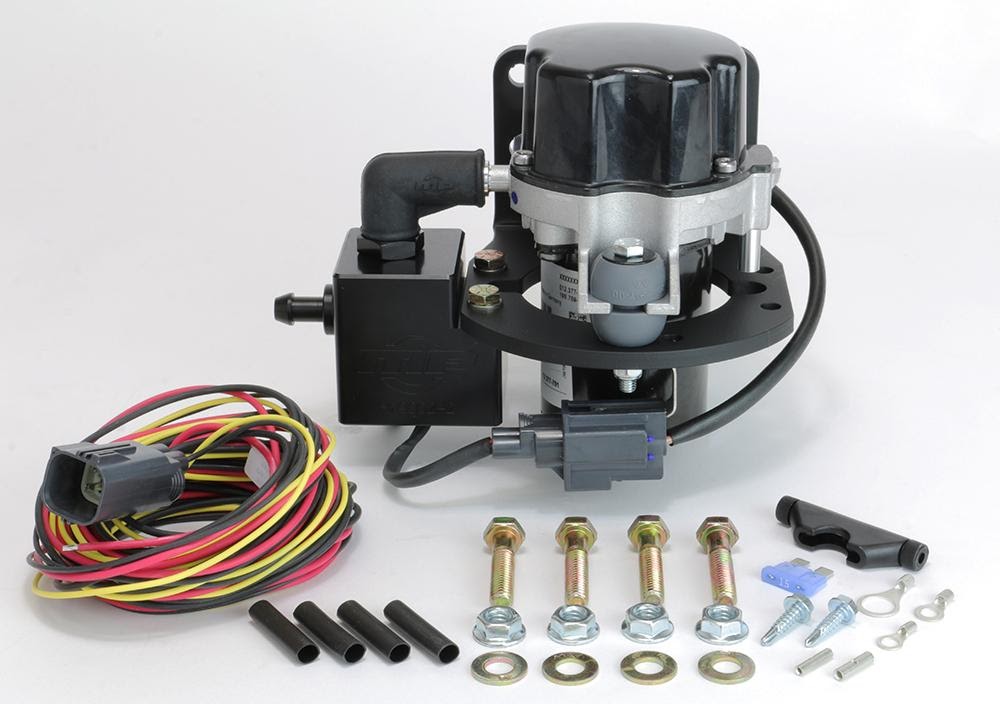Hard Brake Pedal? A Quiet Vacuum Pump Can Boost Your Car’s Performance

A common problem that might arise after making some engine performance improvements is a lack of engine vacuum causing your power brakes to have a loss of vacuum pressure. How do you diagnose this issue, and what can you do about it? We’ll help you determine if this condition applies to you and how to fix it.
How-to Series: Fixing a Power Brake Problem Using an Electric Vacuum Pump
Does your engine make enough vacuum?
How do you know if you have low engine vacuum? Your brakes will feel very hard to apply, as though they require both feet pressing on the pedal to engage them properly. Not only is this unpleasant, but it can be pretty scary!
You may also be interested in: Troubleshooting a Hard Brake Pedal
Vacuum is created by the engine, but sometimes the vacuum is not enough to support a power brakes system.
So, what can you do about it?
Benefits of a Vacuum Pump
The vacuum pump does what the name implies: increases vacuum in the system to the required 18”—making your brake booster perform properly. However, not all vacuum pumps are created equal.
Different Types of Vacuum Pumps
Piston Style Vacuum Pump
Standard vacuum pumps use a piston to create vacuum. While this method gets the job done, it is extremely loud. A standard piston vacuum pump puts out decibels in the mid-80s range, bordering on dangerous noise levels at its worst and very unenjoyable at the least.
Rotary Vane Vacuum Pump
Vacuum Pumps using a rotary vane electric pump offer several advantages compared to the standard piston-style pump. First, the noise level is greatly reduced. Ours measured around 65 decibels, a much safer noise level than that of the output of old standard pumps.
Second, our pump is controlled by a modern module system, employing a solid-state relay on a circuit board rather than the standard ground type switch and relay.
Sidebar: Noisy Brake Vacuum Pump?
Traditional piston vacuum pumps do the job, but the noise is so off-putting that it can make your driving experience unenjoyable. See how our Silent Drive Vacuum Pump compares to standard piston vacuum pumps in noise output, measured in decibels.
Do I Need a Vacuum Pump for My Car?
With both classic and modern cars, there’s a good chance you need a vacuum pump if you’ve had an increase in horsepower and you’ve noticed a decrease in vacuum.
Master Power Silent Drive Vacuum Pump
We’ve formulated our new Silent Drive Vacuum Pump to offer the best vacuum performance, the most comfortable driving experience, and the simplest installation. Our pump features these three major components:
- Self-Contained System
- Rotary-Style Pump
- Complete Stand-Alone System
On MP Brakes’ Silent Drive Vacuum Pump:
“This is a classic case of ‘you get what you pay for.’ Everything for installation is included. It’s a simple two-wire, one-hose hookup, and it is so quiet that you cannot hear the pump when the engine is running. The order-taking, the communication, the packaging, the shipping, the instructions, and the pump itself are all best in class. Thanks MP Brakes for getting me on the road again!”
– Tom, May 2, 2019
View our Silent Drive Vacuum Pump here.
Improve Performance and Reduce Noise
If you have a hard brake pedal, there’s a good chance you’re experiencing a loss of vacuum pressure in your power brake booster. Consider utilizing a quiet vacuum pump to make your braking much more efficient while still enjoying a quiet, comfortable ride. As always, we’re here to help if you need help diagnosing your problem or figuring out what parts you need!
